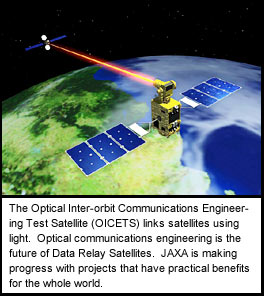

 |
Space development is viewed around the world as a national enterprise. Such public enterprises have different values than private corporations. Rather than seeking a direct financial profit, space development is pursued for the good of humanity and of our planet.
Having said that, the roles of both JAXA and private corporations are changing. We now have a system of shared responsibility: for each project, JAXA brings in a prime contractor from the private sector. The day will come when a private company launches its own rocket into space.
The telecommunications company I was involved with for many years started as a national project as well. Since telecommunications required a great amount of investment, the program needed to be a national enterprise. In the 1980s, however, lower infrastructure and facility costs made it possible for private companies to enter the field. As the market expanded, competition was introduced. Now, it is a highly competitive sector, but the government is still responsible for telecommunications policy and regulation.
I think that in the future, a single organization must take the lead on the research side of space development, while commercial competition is brought in on the application side.
|
|

|
 When I took on the role of President of JAXA, I was surprised to learn that Japan's space development enterprise had contributed so little to the GDP. The scale of the space industry is so small that it could not survive in a market system even if many corporations were in competition for the work. To grow an industry, the market has to be big enough, and there has to be enough demand to form a market. But space development in Japan is still far from that point. Without an expansion of demand, the industry cannot become independent. When I took on the role of President of JAXA, I was surprised to learn that Japan's space development enterprise had contributed so little to the GDP. The scale of the space industry is so small that it could not survive in a market system even if many corporations were in competition for the work. To grow an industry, the market has to be big enough, and there has to be enough demand to form a market. But space development in Japan is still far from that point. Without an expansion of demand, the industry cannot become independent.
The Japanese market will be the first target. The telecommunications, broadcasting and navigation industries have already been making good use of space. Telecommunications and broadcasting are mature industries. The commercial use of navigation satellites is relatively new, but the benefit is that the public can access satellite data for free. So their use has been rapidly expanding in the private sector. Some Japanese companies already sell images taken by satellites owned by U.S. companies. I would like to see more commercial use of satellites in various fields.
The potential commercialization of government projects is another field to cultivate. However, using satellites for Earth observation - of weather systems, land, oceans and atmosphere - is still far from its commercial potential, and I think that it needs national support.
Satellites can be used not just by the launching country, but by others as well. Therefore, we can think of our space-development work as benefiting the whole world. Japan could cultivate demand domestically first, and then market it to the world. Also, countries around the world could take turns being in charge of satellite launches. |
|
|